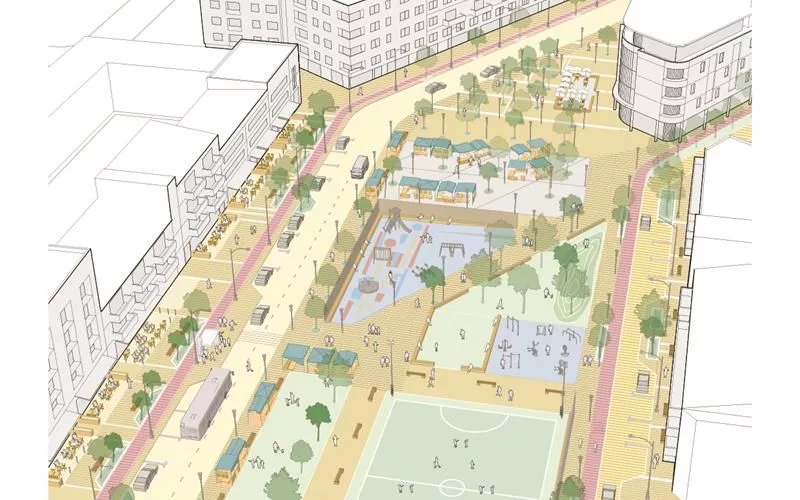Cape Town’s Initiative for Esteemed Spaces is a policy that aims to enhance the aesthetic appeal and quality of public places in the city. The human-centered urban designs transform spaces into purposeful, relevant, and significant places that encourage community development. The policy draws inspiration from principles such as the greater public good, holistic approach, identity, context, and place-making, among others, to create visually captivating, environmentally friendly, economically sound, and socially fair environments in the city.
What is Cape Town’s Initiative for Esteemed Spaces?
Cape Town’s Initiative for Esteemed Spaces is a unique policy that aims to enhance the aesthetic appeal and overall quality of streets, neighborhoods, and public places in the city. The policy focuses on human-centered urban designs that transform spaces into purposeful, relevant, and significant places that encourage community development. The policy draws inspiration from principles such as the greater public good, holistic approach, identity, context, and place-making, among others. The end goal is to create visually captivating, environmentally friendly, economically sound, and socially fair environments in the city.
On the date of August 22, 2024, the governing council of Cape Town endorsed the city’s innovative policy for the creation of Esteemed Spaces. This original policy’s primary objective is to enhance the aesthetic appeal and overall quality of the local streets, neighbourhoods, and public places in Cape Town. The end goal is to establish visually captivating, environmentally friendly, economically sound, and socially fair environments in the city.
Establishing Identity and a Sense of Belonging
The policy aims to encourage local culture and foster a sense of belonging among the residents. It strives to develop spaces that not only add to the physical and mental well-being of the residents but also contribute positively to their general welfare. The unique approach of this policy is the human-centred urban designs that transform spaces into purposeful, relevant, and significant places that encourage community development.
Walking into an aesthetically pleasing neighbourhood or city has an inviting effect, making you want to spend more time there. While we might not all be experts in urban planning, the visual allure and practical functionality of these places play a significant role in our lives. They collectively create an ambiance that feels right and welcoming.
Cape Town’s Deputy Mayor and Mayoral Committee Member for Spatial Planning and Environment, Alderman Eddie Andrews, believes that design should focus on people and communities. According to him, it has the potential to revolutionize spaces, giving them a purpose and meaning that resonates with the people who use them.
Guiding Principles of the Policy
The policy draws inspiration from several principles:
- The Greater Public Good: Urban advancement should be structured in a way that ensures its advantages are accessible to all and generate opportunities for social and economic growth.
- Holistic Approach: Urban design aims to offer a comprehensive understanding of city development, striking a balance but prioritizing the overall performance of the urban environment.
- Identity, Context and Place-making: The unique social, cultural, economic, and physical landscape of Cape Town shapes its unique identity. Place-making should contribute to the unique context of the immediate and broader urban landscape.
- Integration and Spatial Transformation: Design should aim to transform the legacy of segregated development to create a more equitable city.
- Urban Sustainability: Development must align with sustainable development goals, protecting resources, and creating dignified urban environments.
- Intensity, Diversity and Adaptability: Developments should accommodate a wide range of users, amenities, and social groups, blending together different forms, uses, tenures, and densities.
Policy Objectives and Application
These guiding principles subsequently inform the policy objectives which propose a definite spatial structure that encompasses urban, natural and green infrastructures. The emphasis is on high-quality open spaces that encourage social interaction, relaxation, and recreation. The development should enhance safety, promote stability and contribute positively to the community’s general wellbeing.
The policy also encourages the design of streets and squares as multi-functional spaces that prioritize pedestrians. In addition to facilitating access and connectivity, these spaces should be versatile enough to cater to a range of activities and promote social interaction.
Additionally, the policy acknowledges the role of informality in the lives of Cape Town residents, suggesting that urban development should support it. The policy also calls for respecting, protecting, and enhancing natural features, heritage structures, cultural practices, and neighbourhood memories through careful and sensitive design.
This policy comes into effect when development proposals deviate from the city’s planning vision and spatial policies. It is also applicable in the establishment of new neighbourhoods, and when proposals include new subdivisions into more than 20 urban land units. The policy is also relevant when regenerating sites exceeding one hectare, as well as in the creation and upgrading of public open spaces, public or community facilities, and transport interchanges.
The Future of Urban Design in Cape Town
As Alderman Andrews describes it, the city’s Integrated Development Plan envisions a Cape Town that is resilient, inclusive, and efficient in its spatial integration. The newly approved Policy for Esteemed Spaces sets the criteria to ensure that the city’s spatial vision is realized in our local neighbourhoods. The policy for Esteemed Spaces is a significant achievement in the city’s development, offering a blueprint for creating spaces that meet functional needs while contributing to the health and quality of life of Cape Town’s residents.
For further details, visit the policy for Esteemed Spaces here.
What are the policy objectives of Cape Town’s Initiative for Esteemed Spaces?
The policy objectives of Cape Town’s Initiative for Esteemed Spaces include enhancing the aesthetic appeal and overall quality of public places in the city, establishing visually captivating, environmentally friendly, economically sound, and socially fair environments, promoting community development, fostering a sense of belonging among the residents, and encouraging local culture.
What are the guiding principles of the policy?
The guiding principles of the policy include the greater public good, holistic approach, identity, context and place-making, integration and spatial transformation, urban sustainability, intensity, diversity, and adaptability.
How does the policy encourage community development?
The policy encourages community development by focusing on human-centered urban designs that transform spaces into purposeful, relevant, and significant places. It also emphasizes the creation of high-quality open spaces that encourage social interaction, relaxation, and recreation, as well as the design of streets and squares as multi-functional spaces that prioritize pedestrians.
When does the policy come into effect?
The policy comes into effect when development proposals deviate from the city’s planning vision and spatial policies, in the establishment of new neighborhoods, when proposals include new subdivisions into more than 20 urban land units, when regenerating sites exceeding one hectare, and in the creation and upgrading of public open spaces, public or community facilities, and transport interchanges.
How does the policy support informality in Cape Town?
The policy acknowledges the role of informality in the lives of Cape Town residents and suggests that urban development should support it. It also calls for careful and sensitive design that respects, protects, and enhances natural features, heritage structures, cultural practices, and neighborhood memories.
What is the future of urban design in Cape Town?
The future of urban design in Cape Town is envisioned to be resilient, inclusive, and efficient in its spatial integration. The newly approved Policy for Esteemed Spaces sets the criteria to ensure that the city’s spatial vision is realized in local neighborhoods, offering a blueprint for creating spaces that meet functional needs while contributing to the health and quality of life of Cape Town’s residents.












